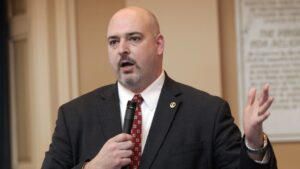
by Dick Hall-Sizemore
The Speaker of the Virginia House of Delegates is widely regarded as the second-most powerful figure, after the Governor, in Virginia state government. Speaker Don Scott (D-Portsmouth), elevated to the position this session after only two terms in the House, has let the power go to his head. Rather than acting like the presiding officer of the whole House, he is behaving like a partisan dictator.
Two events, perhaps related, earlier this week illustrate this attitude.
To help with the understanding of these events, it would be best to state some of the ground rules:
- The Speaker appoints delegates to committees;
- The Speaker assigns bills to committees;
- The Speaker chairs the House Rules Committee;
- The Rules Committee, unlike other committees, can send bills to the Floor without recommendation;
- House Rules require that no amendment to a bill can be on a subject that is different from the one under consideration. This is known as the “germaneness rule”;
- The Speaker can rule on questions of parliamentary procedure;
- The Speaker’s rulings can be challenged. (Invariably, the members of the majority party, the Speaker’s party, will vote to uphold the Speaker’s rulings.);
- The federal Hyde amendment prohibits the use of federal funds to pay for abortions except in cases of life endangerment, rape, or incest.

The first event involved HB 404, introduced by freshman Republican Delegate Tim Griffin (Bedford). The bill prohibited the state from contracting with, or making any grant of public funds to, any facility in which abortions were performed. It also would have repealed two Code sections that allowed state general funds to be used to fund abortions for women eligible for Medicaid in cases of rape, incest, or fetal gross abnormality. The effect would have been to deny Medicaid funding altogether to any hospital that provided abortion services.
Rather than refer the bill to the committee that deals with health and hospitals, Scott referred the bill to the Rules Committee, which he chairs. When the Rules Committee took up the bill, Minority Leader Del. Todd Gilbert (R-Shenandoah) tried to repair the damage by offering to amend the bill to reflect what he said was the actual intention of the patron. That would have made the bill the Virginia version of the federal Hyde Amendment, prohibiting the use of public funding for abortions. He was rebuffed, and the committee voted to send the bill to the House floor without recommendation.
The maneuvering was widely seen as an attempt by Democrats to put Republicans in the position of having to vote for extreme abortion legislation.

When the full House took up the bill on Monday, Gilbert offered a floor substitute. The wording was straightforward, prohibiting the use of state general or non-general appropriations to fund any
abortions, except where required by federal law (i.e. the Hyde amendment). During the debate on the substitute, Del. Marcus Simon (D-Falls Church), the Democrats’ expert on the rules, tried to lay the groundwork that the proposed floor substitute was the exact opposite of the original bill.

He eventually proposed to the Speaker (formally called a “parliamentary inquiry”) that, because it had become the House practice that any amendment turning a bill into having an effect opposite from its original intention was not germane, the proposed amendment should be ruled out of order because it was non-germane. Scott dutifully gave this proposal his consideration as if the whole scenario had not been worked out in the House Democratic Caucus meeting before the session began.
Scott, to no one’s surprise, ruled the floor substitute as non-germane.
Obviously, the ruling was wrong. The proposed floor amendment would not have accomplished the “opposite” of what original bill would have. Both restricted the use of public funds regarding the delivery of abortion services. The floor substitute was less restrictive than the original bill, but certainly not the opposite. Furthermore, the House Rule makes no mention of opposite effects. It says that amendments cannot be on a different subject. Both the original bill and the floor substitute dealt with the subject of public funding of abortion services. It was purely a partisan ruling, designed to keep the Republicans faced with having to vote on an extreme abortion bill.
Gilbert, as was his right, appealed the Speaker’s ruling. Scott seemed surprised and somewhat insulted that his ruling would be appealed. (He obviously was not around when then-Speaker William Howell had to deal with challenges to his rulings from a member of his own party, Del. Robert Marshall (R-Prince William)). The House sustained the Speaker’s ruling on a party-line vote of 51-48.
The fireworks were not quite over. After complaining about the maneuvering, Griffin moved to strike the bill from the calendar. This is not an unusual request and is accomplished “without objection.” Simon was having none of that. He urged his fellow Democrats to vote “no” on the motion to strike. Gilbert and Del. Robert Orrock (R-Caroline) protested that it was customary to grant members the courtesy of striking their bills if they wished to. Simon then changed his motion to “pass by” the motion to strike, which technically would mean that Democrats would not be voting against the motion to strike. The motion to “pass by” was adopted on a party-line vote.
Simon then moved that the bill be engrossed and moved to the final vote stage, while urging the members to vote “no” on the motion. Normally, this is a voice vote with a roll call vote conducted only if the Speaker is unsure of the vote after hearing all the “ayes” and “nays.” The voice vote was obviously “no,” but Scott called for a roll call vote anyway. The bill was then defeated by a vote of 1-95.
The second event unfolded on Tuesday. During the floor session, it was announced that the Speaker had changed some committee assignments. Del. Barry Knight (R-Virginia Beach) was being moved from the Appropriations Committee to the Transportation Committee and Del. Amanda Batten (R-James City County) was being moved from the Rules Committee.
The changes are shocking from a couple of perspectives. First, it is highly unusual for members to be kicked off committees during the middle of a session, and after cross-over, to boot. In fact, I cannot remember of it ever being done. Mr. Haner, who has a better memory of legislative history than I have, may know of some instances.

The demotion of Knight is especially shocking. He is a veteran legislator and has served on the Appropriations Committee for many years and was the ranking Republican on the committee. During the 2022 and 2023 sessions, he was chairman of the committee and performed well in the position. Furthermore, the change was made with less than a week remaining before the Appropriations Committee is scheduled to release its version of the budget bill.
No explanation was provided by the Speaker’s office for the changes. Knight, who was given no advance notice of the change and learned about it when it was announced on the floor, said he suspected that it was in retribution for the clash on the House floor over the abortion bill the day before. To pour salt into the wound, Knight’s replacement was Del. Anne Ferrell Tata (R-Virginia Beach), who is beginning only her second term in the House.
The other delegate affected, Amanda Batten, is the chair of the House Republican Caucus.
Elephants supposedly have long memories and Republicans will remember this. When they are next in the majority in the House, Don Scott is likely to be relegated to the Committee on Counties, Cities, and Towns and assigned to review all the charter bills. Furthermore, every bill he introduces will likely be summarily killed.

Leave a Reply
You must be logged in to post a comment.